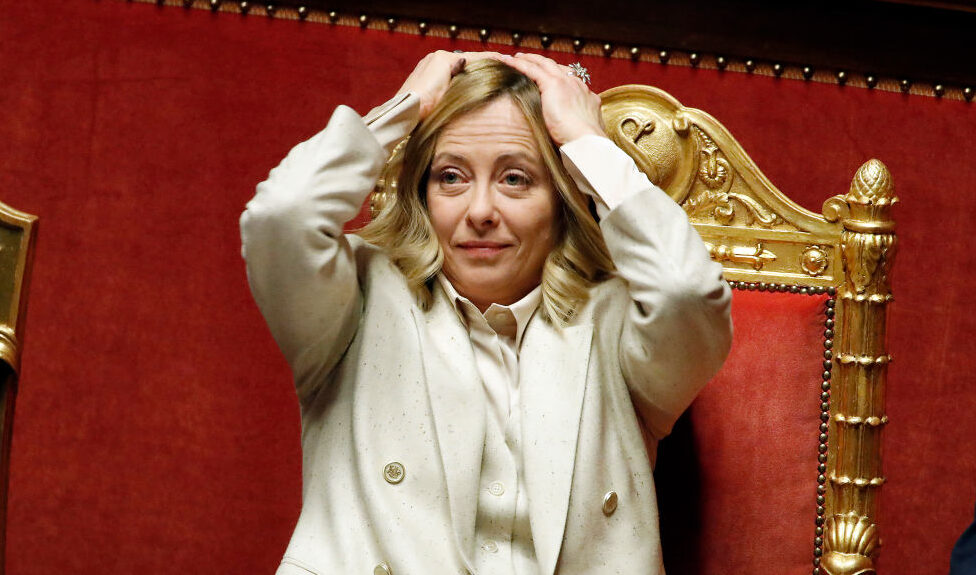Can Giorgia Meloni save Italy — and Europe along with it? Massimo Di Vita/Archivio Massimo Di Vita/Mondadori Portfolio/Getty Images
The great unification processes of the late 19th century inspired some of the world’s most famous authors. In 1886, Henry James explored the triangular relationship between a Confederate War veteran from Mississippi and two New England feminist abolitionists in The Bostonians. Fifteen years later, Thomas Mann’s Buddenbrooks chronicled not only the downfall of a Hanseatic merchant family, but also the enduring chasm between north and south in Germany.
If both Henry James and Thomas Mann were writing relatively close to the period they were depicting, Giuseppe Tomasi di Lampedusa’s The Leopard (1958) was written nearly a hundred years after the event. It is nevertheless considered a classic account of the Italian Risorgimento, examining it through the Prince of Salina, a Sicilian aristocrat in his mid-forties who grapples with the forces unleashed on the island by the collapse of the old Bourbon Regime in 1860. And the film version by Luchino Visconti (1963) is still one of the most powerful pieces of cinema ever created.
The Leopard is an extraordinarily ambivalent and complex work of art, but from the historical and political point of view, it is dominated by two themes. First, there is the tension between continuity and change. The Prince, initially loyal to the King in Naples, is persuaded by his impetuous young nephew, Tancredi, that he should embrace the revolution and in so doing neutralise it. “Unless we ourselves take a hand now,” Tancredi famously warns, “they’ll foist a Republic on us. If we want things to stay as they are, things will have to change.”
At least on the surface, it seems as if the Prince’s bet pays off. The revolutionary zealots of Garibaldi are soon replaced by the polished Piedmontese officers of the new united Italian army. The inhabitants of the Prince’s summer holiday retreat at Donnafugata welcome him back as if nothing had changed. Tancredi marries the daughter of the wealthy upstart mayor Don Calogero and goes into politics.
Second, The Leopard exposes the failure of Italian Unification. Lampedusa shows it to have been basically a takeover of the south by the north. The Piedmontese envoy sent to persuade the Prince to become a senator in the new united legislature refers to the happy “annexation” before hastily correcting himself to “union” while the Prince himself predicts that it will “simply mean Torinese rather than Neapolitan dialect, that is all”. Unification was also maimed at the start by the mendacity of the liberal nationalists who simply binned contrary votes in the referendum on unification. In the film, the announcement of the cooked result becomes farcical as the off-key band keeps on breaking into Don Calogero’s platitudinous speech.
The enduring relevance of The Leopard to Italy is obvious. Nearly 175 years after unification, the country remains fundamentally divided between north and south, and more so than any other European country. The Mezzogiorno — as the south of the country is often called — still lags far behind the more developed north. A major contemporary political party, the Lega, formerly Lega Nord, has espoused secession in the past. No wonder that The Leopard is a set text in Italian schools.
It is with respect to Europe as a whole, though, that the book resonates most powerfully today. Before we can understand why, we need to come to a better understanding of the author’s beliefs and intentions. The cynical phrase about things changing so that they can stay the same was certainly Tancredi’s belief and the Prince’s hope, but it reflected neither Lampedusa’s own programme, nor what he was trying to convey about the nature of the Risorgimento. It has been widely misinterpreted.
The author despaired not only of the Sicilian aristocracy from which he descended but also of the island as a whole. We know from his excellent biographer David Gilmour that Lampedusa was no reactionary, but an Anglophile Whig. He dearly wished that his ancestors had grasped, for example, the possibilities opened up to them by the British-brokered Sicilian constitution of 1812. He wanted nothing more than for his countrymen to wake from their torpor and join what he called in the novel “the flow of universal history”. Visconti captured this inertia well with the two great scenes which bookend his film: the lengthy opening recitation of the rosary, so rudely interrupted by news of Garibaldi’s landing; and the interminable dance sequences, a kind of aristocratic rosary, at the end, punctuated by gunshots marking the execution of some now redundant revolutionaries.
It was, in fact, the Prince himself who delivered the most devastating indictment of Sicily’s failure to progress. Surely, the kind if naïve Piedmontese envoy asks, “the Sicilians must want to improve”? The Prince replies that “the Sicilians never want to improve for the simple reason that they think themselves perfect; their vanity is stronger than their misery”. Their “pride”, he continues, is merely “blindness”. What Sicilians want from politics, the Prince says, is “sleep and they will always hate anyone who tries to wake them”. That is why, he explains, the island had always been a “colony” and, we intuit, always will be.



